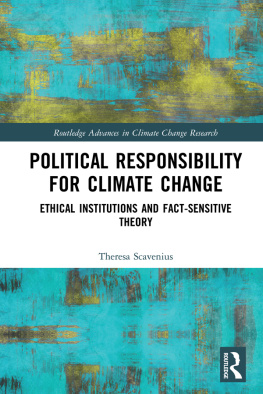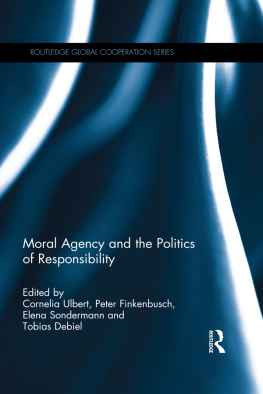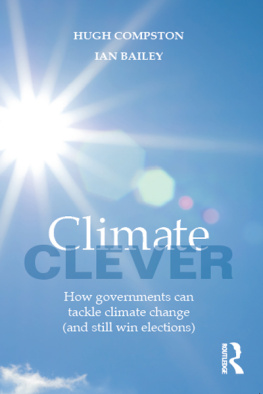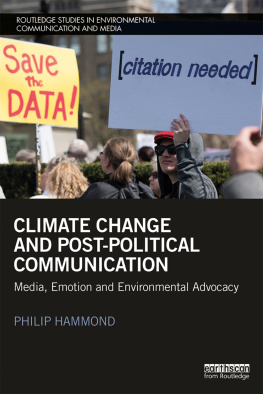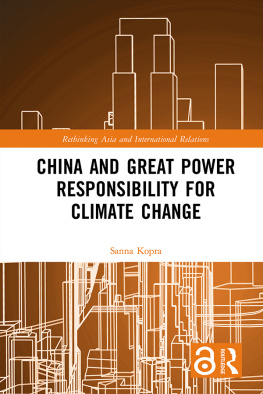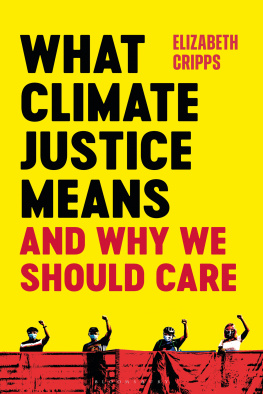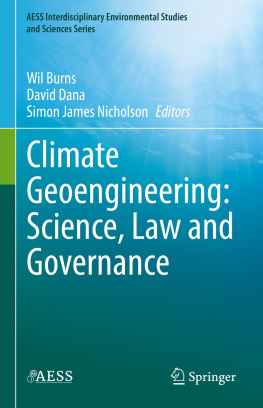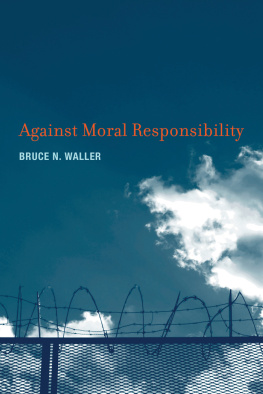Political Responsibility for Climate Change
This book offers new perspectives on how social and political institutions can respond more effectively to climate change.
Theresa Scavenius presents a concept of moral responsibility that does not address the obligations of individual citizens, but instead assesses the moral responsibility of institutionalised actors, such as governments, parliaments, and other governmental agencies. This focus on political responsibility is something that up until now has largely been neglected by moral theory, but Scavenius argues in this book that accountability must be assigned to institutionalised group agents. With this new research, she outlines building blocks for a new agenda of climate studies by offering an innovative approach to climate governance and democratic climate action at a time when many political initiatives have failed and crucially outlines the necessity of approaching moral dilemmas from a fact-sensitive political theoretical approach.
Written in a clear and engaging style, this volume will be an invaluable reference for researchers interested in moral philosophy, climate change, environmental politics and policy, and institutional theory.
Theresa Scavenius is an Associate Professor in the Department of Planning, University of Aalborg, Copenhagen, Denmark.
Routledge Advances in Climate Change Research
Climate Change, Moral Panics and Civilization
Amanda Rohloff
Edited by Andr Saramago
Climate Change and Social Inequality
The Health and Social Costs of Global Warming
Merrill Singer
Cities Leading Climate Action
Urban Policy and Planning
Sabrina Dekker
Culture, Space and Climate Change
Vulnerability and Resilience in European Coastal Areas
Thorsten Heimann
Communication Strategies for Engaging Climate Skeptics
Religion and the Environment
Emma Frances Bloomfield
Regenerative Urban Development, Climate Change and the Common Good
Edited by Beth Schaefer Caniglia, Beatrice Frank, John L. Knott Jr., Kenneth S. Sagendorf, Eugene A. Wilkerson
Local Activism for Global Climate Justice
The Great Lakes Watershed
Edited by Patricia E. Perkins
Political Responsibility for Climate Change
Ethical Institutions and Fact-Sensitive Theory
Theresa Scavenius
For more information about this series, please visit: www.routledge.com/Routledge-Advances-in-Climate-Change-Research/book-series/RACCR
First published 2020
by Routledge
2 Park Square, Milton Park, Abingdon, Oxon OX14 4RN
and by Routledge
52 Vanderbilt Avenue, New York, NY 10017
Routledge is an imprint of the Taylor & Francis Group, an informa business
2020 Theresa Scavenius
The right of Theresa Scavenius to be identified as author of this work has been asserted by her in accordance with sections 77 and 78 of the Copyright, Designs and Patents Act 1988.
All rights reserved. No part of this book may be reprinted or reproduced or utilised in any form or by any electronic, mechanical, or other means, now known or hereafter invented, including photocopying and recording, or in any information storage or retrieval system, without permission in writing from the publishers.
Trademark notice: Product or corporate names may be trademarks or registered trademarks, and are used only for identification and explanation without intent to infringe.
British Library Cataloguing-in-Publication Data
A catalogue record for this book is available from the British Library
Library of Congress Cataloging-in-Publication Data
A catalog record for this book has been requested
ISBN: 978-0-367-18970-9 (hbk)
ISBN: 978-0-367-18972-3 (ebk)
Typeset in Times New Roman
by Apex CoVantage, LLC
In memoriam
Merle Scavenius
Contents
PART 1
Fact-sensitivity and normativity
PART 2
Fitness-conditions of moral responsibility
PART 3
Moral responsibility for climate change
Guide
This book concerns what type of agents can be held responsible and what type of agents should be held responsible for anthropogenic climate change. I offer a general theory of why can- and fitness-conditions of moral agency are necessary, albeit not sufficient, premises for the assignment of ought to particular agents. I also provide a special theory of why institutionalised group agents should be held morally responsible for climate change. The objective of this work is to combine insights from moral philosophy and descriptive political science; the account of moral responsibility for climate change offered is theoretical and normative in character.
The political failures of climate actions
There is a vast accumulation of technical knowledge about climate change. For a decade now, political and social scientists have documented in great detail how global climate change will have severe impacts on social, human, and environmental conditions. Human choices, industrial production, and lifestyles affect the dynamics of the planets climate and the basic life-support system for all forms of life (N. Stern 2006; Gardiner 2010).
The need to integrate environmental considerations into national socio-economic planning is now widely recognised (Rose 2011). Advanced environmental legislation and climate strategies are implemented in many cities, municipalities, and countries across the world (Bulkeley 2013; Hoff and Strobel 2013). In 2011, Rose counted 700 international environmental agreements that exist at bilateral, regional, and multilateral levels (Rose 2011). Today, there are many more.
Although many citizens, stakeholders, and nation-states have made great efforts in initiating policies to manage both climate change and the unsustain-ability of natural resource consumption, two statistics expose the profound political challenges that remain. First, the total consumption of coal, considered to be critically damaging to human health and the environment, rose 50 percent in the decade between 2000 and 2010 (IEA 2011). Second, in 2013, the concentration of carbon dioxide in the atmosphere reached 400 parts per million (ppm) its highest level since measurements and collection of data began in 1956. Since then, the concentration has increased every year. Yet despite the good intentions and promising results of many of these global climate initiatives, these numbers tell us a sobering truth: we have yet to manage and control the combustion of fossil fuels. As if this werent enough, according to a recent World Wildlife Fund study, most of the earths natural resources are overused and likely to collapse in the near future (WWF 2012).
At the global level, the United Nations has hosted several international climate conventions since 1992, and the International Panel for Climate Change (IPCC) has collected an ever-increasing body of scientific evidence on climate change. The two main international agreements on environmental and climate policy are the 1987 Montreal Protocol, which aims to reduce the emissions of chlorofluoro-carbons (CFCs) and other ozone-depleting substances, and the 1997 Kyoto Protocol, which aims to reduce the emissions of greenhouse gases (GHG).
Another political failure was the Conference of the Parties (COP)15 meeting in Copenhagen in 2009, which in international academic and policy communities has become a point of reference as a great disappointment of contemporary global climate policy (Gardiner 2011). In Copenhagen, the worlds leaders failed to agree on a legally binding global agreement. This fiasco is commonly held as proof of the lack of willingness to pay the costs of re-establishing an environmentally sustainable economy (Hoff and Strobel 2013). The Paris Agreement, ratified in 2015, is also a non-binding agreement.

